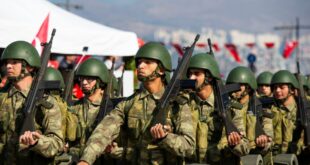Development of gas supply routes, designed to solve the problem of Russia’s monopoly, is one of the main things that the EU is concerned. What projects do you consider the most viable?
EU has been thinking on different ways to deal with overdependence on single source of gas imports. It is worth remembering that this is the serious problem for some of EU regions – namely South Eastern, Central Eastern Europe and the Baltics + Finland. Their exposure to risks related to possible gas supply cuts were clearly shown in the last years stress tests conducted in many European countries. And exposure to anticompetitive practices by Gazprom is just being examined it EC antitrust case. And as suggested eg in recent EC communication on Energy Union strategy there are different tools enabling fighting negative consequences of overdependence: completing internal market (with full application of existing EU law and use of existing + construction of new internal infrastructure); using indigenous energy resources; increasing EU solidarity & cooperation internally & in energy relations with third countries – its unity &bargaining power and last but not least – diversification of sources. So building new routes of gas supplies is an important tool here, but just one of a few.
When diversification of gas sources to the EU is being discussed we see reemerging importance of Southern Gas Corridor – especially when it comes to political strategies & focus. It is the first project mentioned in ‘diversification of supply’ part of Energy Union package, EC VP is actively lobbying for its quicker construction and increased capacity travelling to Baku, Ashgabat & Ankara. So Southern Corridor has succeeded to somehow regain its political momentum. AT the same time we also see increased competition for it from Russia – as after South Stream cancellation it has now focused on Turkish Stream project and increased gas cooperation with Turkey. And it is not sure how this cooperation will influence both projects – if p.ex. at the end majority of Russian gas wouldn’t flaw via TAP pipeline of Western Balkans one changing the primary ideas behind Southern Corridor quite significantly. Additionally the constraints hampering construction of a ‘big’ corridor from Caspian & Middle East to the EU hasn’t disappeared: EU gas demand is still depressed, EU gas sector is suffering problems and so may be not that eager to build new pipelines unless they are explicitly economically viable.
In parallel to Southern Gas Corridor EU has been focusing on LNG and it is about to propose for a first time an EU LNG strategy. It would be for sure about making full use of infrastructure which is already in place (and not fully used) and about building new one where it is most needed.
But then again for the longer term market share of LNG on EU gas market its price, relative to gas from other sources and other sources of energy remains the key factor.
What is the probability of the revival of “Nabucco”, as the Bulgarian prime minister said at a meeting with President of Azerbaijan a few days ago?
We observe recently renewed interest in different gas projects in SEE & CEE regions. There are renewed discussions about both Nabucco (or more something similar to Nabucco-West), there are considerations of doubling TAP capacity & even some mention again ITGI project. Additionally Bulgaria wants to become a gas hub, Romania proposed Vertical Corridor &
Slovakian TSO – Eastring. There is also renewed focus on LNG terminals p.ex. in Krk & interconnecting the region internally, with the EU & new suppliers. In parallel to that Russia pushes forward its Turkish Stream project and also signals possibility of building a pipeline via Macedonia & Serbia to Hungary. It is quite sure that, due to already mentioned low gas demand in the EU, economic viability etc – only minority of this projects may be actually realized at least in the near future. And probably those realized will not be the most ambitious ones.
The EU is seriously considering the prospect of supplies of Turkmen and Kazakh gas to Europe through the territory of Azerbaijan. How likely is this scenario as long as there are objections from the Russian side and the Caspian countries have not solved yet the problem of the legal status of the Caspian Sea?
I guess legal problems concerning Caspian Sea status are just one side of the coin here. As you probably know the Trans Caspian project has been discussed for many years now, and there has been proposals to construct just short pipeline connecting Azeri & Turkmen offshore deposits. For the feasibility of such connection key is Turkmen-Azeri agreement. But there are other challenges – one of them is that up to now Turkmenistan wanted to sell its gas on its borders & to make that happen EU has been (already long time ago) discussing option of gas demand aggregation and creation of Caspian Development Corporation. It did not succeed then. Right now EU again looks into the question of possibility of voluntary demand aggregation – so if it finds some feasible solutions it may possibly be a chance to try to attract Turkmen gas to Southern Gas Corridor. But the outlook is unclear. And one must remember that EU would have to be able to be compete effectively with Chinese direction of exports and face the fact of playing against Russian interests in the region.
How viable could be a project “Turkish Stream”, implemented by Russia? Can this project be faced with opposition from the EU, as it was in the case of the “South Stream”?
Much depends on what will be the exact shape of Turkish Stream. 2 off-shore pipelines of that project (of joint capacity of ~30bcm) can be built with pipes already contracted from Saipem – such a capacity would enable meeting Turkish & Balkan gas demand & so supplying them via Turkey not Ukraine. If the gas for Balkan countries is actually to be sold at a kind of a gas hub in Turkey – then, unless Turkey becomes a member of Energy Community, it would not be subject to EU law. It would mean though that Russian Gazprom would have to renegotiate multiple supply contracts and change gas destination points – which may be complicated. It would also mean Russia entering an even more direct competition with right now intensively promoted by the EU Southern Corridor project.
“Gazprom” has warned that it would stop gas transit to Europe through Ukraine after 2019. What can the EU do to meet its needs in the case of this scenario?
First of all – Gazprom suggested it will stop gas transit via Ukraine in case Turkish Stream is built. It is also somehow limited by its contractual obligations vs European customers. But even if there is no Turkish Stream and Gazprom decides to stop sending its gas via Ukraine I guess EU already has some options to deal with that & in a few years time shall have additional ones: p.ex. new LNG capacities being built (as Swinoujscie LNG terminal in Poland), interconnectors & reverse gas flows with improved management of EU storage & existing LNG capacities and with hopefully built & functioning TAP & TANAP connections. That should enable replacing at least part of Russian gas – of course at a price. I am also afraid that if sustained problems with / risks related to Russian gas supplies may be one more problem adding up to already existing which make gas role in EU energy mix more and more problematic.
 Geostrategic Media Political Commentary, Analysis, Security, Defense
Geostrategic Media Political Commentary, Analysis, Security, Defense





